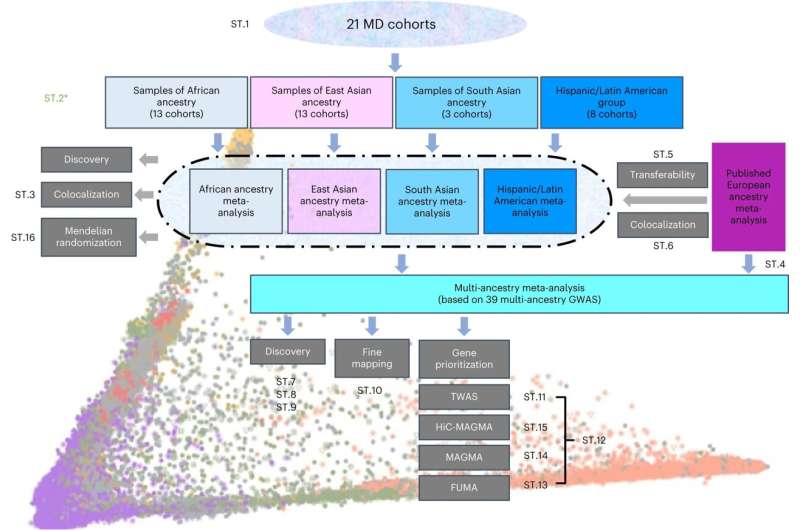This article has been reviewed according to Science X's editorial process and policies. Editors have highlighted the following attributes while ensuring the content's credibility:
fact-checked
peer-reviewed publication
trusted source
proofread
Newly identified genes for depression may lead to new treatments

More than 200 genes linked to depression have been newly identified in a worldwide study led by UCL researchers.
The research, published in Nature Genetics, found more than 50 new genetic loci (a locus is a specific position on a chromosome) and 205 novel genes that are associated with depression in the first large-scale global study of the genetics of major depression in participants of diverse ancestry groups.
The study also showcases the potential for drug repurposing, as one of the identified genes encodes a protein targeted by a common diabetes drug, while also pointing to new targets for drugs that may be developed to treat depression.
Depression is very common, yet how it develops is still poorly understood. Genetic research using big data offers new avenues to understand the disease and has uncovered dozens of genes associated with depression, each of which individually confers only a small increase in risk. It can also help find new drug targets, but so far, research has mainly focused on people of European ancestry, which the researchers say is a major shortcoming, especially for such a complex condition as depression.
The new paper involved multiple genetic research methods, including genome-wide association studies, a meta-analysis of previously published data, and a transcriptome-wide association study. The international research team reviewed genetic data from 21 study cohorts from several countries and included nearly one million study participants of African, East Asian, South Asian, and Hispanic/Latin American descent, including 88,316 people with major depression.
The study has made major advances in identifying genes that are linked to the risk of depression, both for newly identified links and by strengthening prior evidence, and showcases some genes with potential implications for drug development, such as NDUFAF3.
The protein that NDUFAF3 encodes has been implicated previously in mood instability, and it is targeted by metformin, the first-line drug for treating type 2 diabetes. Animal studies of metformin have suggested a possible link with reduced depression and anxiety, so this latest finding further suggests that additional research into metformin and depression may be warranted.
Other genes identified in the study may have biologically plausible links with depression, such as a gene linked to a neurotransmitter involved in goal-directed behavior and genes encoding a type of protein previously linked with multiple neurological conditions.
Surprisingly, the researchers found less overlap in the genetic hits for depression across ancestry groups than expected, at about 30% (based on a new method developed by the research team to gauge the degree to which a genetic association found in one ancestry group is applicable to another ancestry group), which is less overlap than previously found for other traits and diseases.
Therefore, it is even more important to study depression in diverse samples because some of the findings might be ancestry-specific.
Lead author Professor Karoline Kuchenbaecker (UCL Psychiatry and UCL Genetics Institute) said, "Here we show beyond doubt that our understanding of such complex diseases as depression will remain incomplete until we overcome the Eurocentric bias in genetics research and look for causes in diverse people across the world."
"Many genes previously found to be linked to the risk of depression might only actually affect depression risk in people of European origin, so in order for genetic research to contribute to new drugs that can help people of all ancestries, it is vital that our genetic datasets are suitably diverse."
Professor Kuchenbaecker added, "This is a first-stage discovery effort, so more work will be needed to confirm these new targets, but finding them in the first place has been a huge and vital challenge, especially for a disorder where new medications are so urgently needed."
More information: Xiangrui Meng et al, Multi-ancestry genome-wide association study of major depression aids locus discovery, fine mapping, gene prioritization and causal inference, Nature Genetics (2024). DOI: 10.1038/s41588-023-01596-4





















